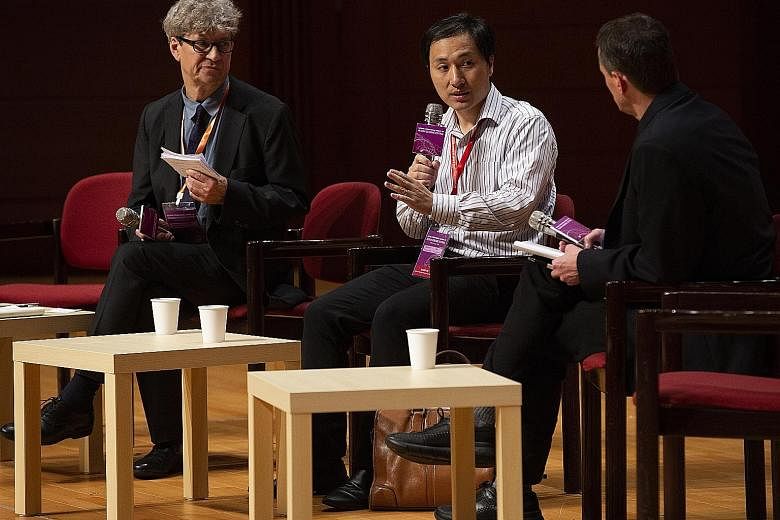HONG KONG • The Chinese scientist who claimed to have created the world's first genetically edited babies has defended the highly controversial procedure, but said the trial would be paused following an international outcry.
Dr He Jiankui yesterday told a packed Hong Kong biomedical conference that he was "proud" to have successfully altered the DNA of twin girls born to an HIV-positive father - an apparent medical breakthrough.
But details of the experiment, which has not been independently verified, triggered an immediate backlash, with experts denouncing Dr He's work as an ethical "mess".
Said Dr He: "The clinical trial was paused due to the current situation. For this specific case, I feel proud, actually, I feel proudest."
The university professor said the twin girls, born a few weeks ago, had their DNA altered to prevent them from contracting HIV. Eight volunteer couples - HIV-positive fathers and HIV-negative mothers - signed up to the trial, with one dropping out before it was paused.
He said there was "another potential pregnancy" involving a second couple but when questioned further, he said it was a chemical pregnancy - a term referring to an early miscarriage.
The experiment has prompted heated debate among scientists over the risks involved. Experts said editing human embryos can create unintended mutations in other areas, known as "off-target effects", which can have an impact throughout the lifetime.
Dr He, responding to questions from the audience, said: "The volunteers were informed of the risks posed by the existence of one potential off-target, and they decided to implant." He also said he personally paid for most of the patients' medical expenses, and that his university in the southern Chinese city of Shenzhen was unaware of the study.
The Southern University of Science and Technology distanced itself from Dr He, saying he has been on unpaid leave since February and had "seriously violated academic ethics".
The organisers of the Second International Summit on Human Genome Editing, where Dr He was speaking yesterday, also said they had not known about his work.
Conference moderator Robin Lovell-Badge said Dr He's trial was a "backward step" for the science industry, but described the babies' birth as "momentous" nonetheless.
He said: "This is an example of an approach that was not sufficiently careful and cautious and proportionate. Clearly, however, it is a momentous point in history."
Summit chair David Baltimore, a Nobel laureate, said there had been "a failure of self-regulation by the scientific community".
Dr He, who was educated at Stanford University, said the twins' DNA was modified using CRISPR, a technique that allows scientists to remove and replace a DNA strand with pinpoint precision.
Gene editing is a potential fix for heritable diseases but it is extremely controversial because the changes would be passed down to future generations, and could eventually affect the entire gene pool.
In many countries, the editing of human DNA is tightly controlled.
Dr He has not released the identities of the participants of his trial.
University of Massachusetts Lowell Assistant Professor Nicholas Evans tweeted: "Don't get me wrong, privacy is vital here. But I am concerned that no one is ever going to get to independently corroborate the story."
AGENCE FRANCE-PRESSE

